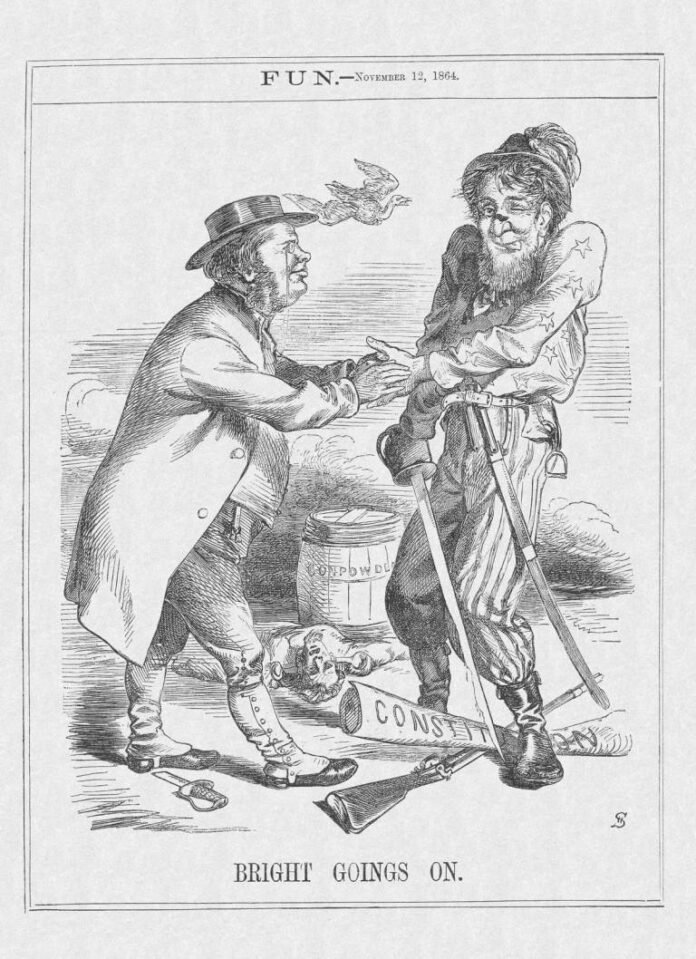Today marks the 200th birthday of John Bright, a figure largely overlooked in contemporary times but who stood as one of Britain’s most impactful statesmen of the nineteenth century, both domestically and internationally. Particularly noteworthy is his staunch opposition to slavery and his advocacy for the North during the American Civil War.
Bill Cash.
Also Read: On The Smiling Face Of Harpo Marx
John Bright’s Testimonial For Abraham Lincoln: A Touching Memento
On April 14, 1865, following the assassination of Abraham Lincoln by John Wilkes Booth, a number of deeply personal items were discovered in the late president’s pockets. These items held great sentimental value to Lincoln, serving as poignant mementos of his monumental struggles over the past year.
Among these cherished possessions were a symbolic Confederate five-dollar bill, a newspaper clipping detailing unrest within the Confederate army, a record of emancipation in Missouri, and the Union election address of 1864.
Most notably, Lincoln carried a testimonial written by John Bright, urging for his re-election. This testimonial, printed by Horace Greeley—a staunch anti-slavery advocate and peace campaigner—in the New York Tribune, gained widespread circulation in publications such as The Times and other newspapers.
On April 29, 1865, shortly after learning of Lincoln’s tragic demise, Bright independently recalled having penned this endorsement letter. However, at the time of writing, he could not have known that Lincoln would carry it with him at the moment of his untimely death.
Abraham Lincoln’s Esteem For John Bright
Abraham Lincoln held John Bright in high regard, evident from various gestures of admiration and personal esteem. As early as December 1861, Lincoln gifted Bright two copies of a portrait of himself.
Republican senator Charles Sumner later confirmed Bright’s significance to Lincoln by noting that Bright’s full-length photograph was prominently displayed in the president’s office alongside a portrait of his predecessor, Andrew Jackson.
Furthermore, after Lincoln’s assassination, Mrs. Lincoln presented Bright’s photograph to Sumner, describing it as a cherished possession of her late husband, symbolizing Bright’s role as a noble and valued friend in their efforts during the Civil War.
This underscores Lincoln’s deep admiration and personal esteem for Bright, whom many credited with preventing conflict between America and England during a turbulent period when influential commercial interests, MPs with connections to Confederate contracts, and some members of the House of Commons supported the South.
Additionally, Bright played a crucial role in the coalition that persuaded Lincoln to issue the proclamation against slavery in the fall of 1862.
John Bright’s Influence On American Politics
John Bright’s dedication to America predates the Civil War and intertwines deeply with his beliefs in free trade, parliamentary reform, democracy, and liberty. He sculpted a bust of John Bright, akin to President Obama placing Abraham Lincoln’s bust in the White House during his inauguration.
Originally intended as a gift for Abraham Lincoln, the bust arrived in Washington after the president’s assassination. It was initially housed in the State Department before being transferred to the White House in June 1866, where it was positioned in one of the alcoves of the lower hall.
Jackie Kennedy rediscovered the bust and relocated it near the public entrance of the White House, where it remains, even after the return of Winston Churchill’s bust, which the British Government loaned during George W. Bush’s presidency.
John Bright’s Revered Reputation In Lincoln’s Inner Circle
In 1861, William H. Seward, serving as secretary of state then, corresponded with Charles Sumner, who chaired the Senate Foreign Relations Committee and maintained regular correspondence with Bright. Seward’s letter highlights Bright’s esteemed reputation and unwavering commitment, indicating that he regularly passed Bright’s letters to Abraham Lincoln and discussed them in Cabinet meetings.
I deeply appreciate your examination of the admirable letter from John Bright. While it is disheartening for the cause of humanity, it is commendable for John Bright to be the sole Englishman in a public position or of notable character who has expressed any sentiment in favor of preserving the American Union. Please convey to him my gratitude for his integrity, courage, and virtue.
Lincoln’s Recognition Of Bright’s Influence
In October 1863, President Lincoln demonstrated his admiration for John Bright by granting a presidential pardon to one of Bright’s constituents.
Alfred Rubery was found guilty around October 12, 1863, of participating in and providing support to the ongoing rebellion against the government of this nation. Consequently, the court sentenced him to ten years of imprisonment and imposed a ten-thousand-dollar fine.
…
As Alfred Rubery is a citizen of Great Britain and John Bright of England has requested his pardon;
Therefore, I, Abraham Lincoln, President of the United States of America … as a public demonstration of the respect and enduring friendship of the United States of America towards John Bright, hereby issue a pardon to Alfred Rubery.
Also Read: An Angolan Reading List


